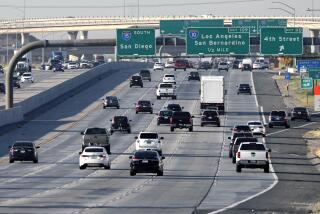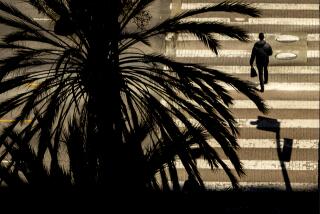Increased Penalties Deter Drunk Drivers, Study Finds
- Share via
The best way to keep drinking drivers off the road is to increase penalties for such antisocial behavior, researchers studying California accident records said Wednesday.
“It’s a very simple economic theory,” said John Umbeck, an associate economics professor at Purdue’s Krannert School of Management.
“When you raise the price of something--in this case, the legal costs of drinking and driving--you reduce the demand for it. Stronger deterrents do make a difference when it comes to cutting down on drunken driving,” he said.
CHP Agrees
The California Highway Patrol, gearing up for the usually deadly holiday driving period, agrees that stiff penalties are a deterrent, but officials also believe enforcement and public awareness are critical to curbing drunks.
“There is a dramatic decrease in drunken driving when stiffer penalties are imposed,” said CHP spokeswoman Susan Cowan-Scott in Sacramento. “But also critical is enforcement and public awareness. Sobriety checkpoints are used as a deterrent, for instance, not to arrest drunken drivers.”
Sobriety checkpoints are not being used this year, she said.
Umbeck and Patrick McCarthy, also an associate economics professor at Purdue, based their analysis on statistics compiled on motor vehicle accidents reported in California from 1981 to mid-1986.
Data on arrests by police and the California Highway Patrol and disposition of the cases in court also was studied.
The study, sponsored by Arco, found that motorists faced with increased penalties such as jail, license suspension and mandatory alcohol rehabilitation programs will drink and drive less.
New State Laws
As of Jan. 1, a series of new state laws will take effect dealing with drunk drivers.
One of those would allow the court to order ignition-locking devices to be installed on the cars of convicted drunk drivers. Such devices would require that a person breathe into a tube that would measure his blood alcohol level. If the level is too high, the device prevents the car from being started.
Other measures would increase the punishment for drunk driving, use some of that money for alcohol-abuse education programs and empower local governments to seize and sell the cars of convicted drunk drivers.
In the early 1980s, local governments received the power to charge drunk drivers who kill someone with second-degree murder, which carries a penalty of up to life in prison. Traditionally, drunk drivers had been liable only for vehicular manslaughter charges and faced up to six years in prison.
The California study was compared with a separate study of the effects of a tough drunk driving law in Ohio.
In Ohio, the number of such such accidents as a percentage of all accidents decreased by 15% since the 1983 law took effect, the researchers said.
California drivers are facing one of the longest holiday driving periods, from Wednesday at 6 p.m. to midnight Sunday. The worst Christmas holiday death toll in the state was in 1979, a similar four-day period, when 88 people were killed on state roads, Cowan-Scott said.
More to Read
Sign up for Essential California
The most important California stories and recommendations in your inbox every morning.
You may occasionally receive promotional content from the Los Angeles Times.













